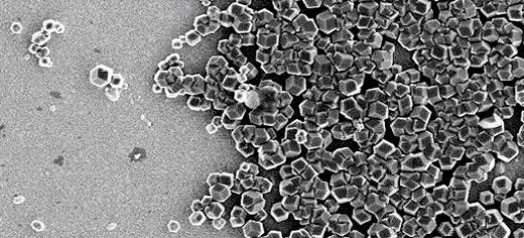Computer made from bacteria
In the future, today's smaller computers can be made up of iron-eating bacteria.
According to the research team at Leeds University (UK) and Tokyo University of Agriculture and Technology (Japan), when digesting iron, iron-eating bacteria create tiny magnets in their bodies, similar to those in hard drives. of PC. Therefore, bacteria that eat iron can help create hard drives that run faster.
According to research published in Small magazine, as technology develops and computer components become smaller and smaller, the production of electronic components with nanoscale is getting harder and harder.
Therefore, scientists now mimic nature by using bacteria.
The team used Magnetospirilllum magneticum bacteria - naturally magnetic microorganisms that normally live in water environments, such as ponds and lakes . in the lower water layer, where oxygen is very low. They swim along the magnetic field of the earth, aligning in the magnetic field like a compass needle to find oxygen. When they eat iron, their proteins interact with iron to create iron ore deposits from extremely small minerals.

Tiny magnets in the bacterial body. (Source: BBC)
After studying how bacteria collect, form, and locate nanoscale magnets in their bodies, researchers have learned this method and applied it outside the bacterial body to create the male type. Magnets may help create future computer hard drives.
'We are rapidly reaching the limits of traditional electronics manufacturing as computer components become smaller and smaller. The type of machine we are using is still bulky. Nature provides us with an effective tool to solve this problem, " said Dr. Sarah Staniland of Leeds University.
In addition to using microorganisms to create magnets, the researchers also created extremely small wires from living microorganisms.
They created nanoscale tubes from cell membranes, cultured in a laboratory environment with the help of a protein in the lipid molecule in the human body. The cell membrane is like a biological wall that separates the inside of cells from the outside environment.
In the future, these tubes can be used to create biofuel wires that are so small that they can only be seen under a microscope, but still capable of transmitting information - like cells in the human body. , TS. Masayoshi Tanaka of Tokyo University of Agriculture and Technology explained.
"This type of biological conductor has the ability to resist electricity and transmit information from a set of cells inside the bio-computer to other cells," Dr. Tanaka said.
In addition to computers, this type of bio-conductor can also be used in surgery for people because of its high compatibility.
- Has linked bacteria to the computer
- Tablets made from wood
- Computer model of sexually transmitted bacteria
- The weirdest computer ever made - made from assembled toys and fishing lines
- Made in Vietnam 'made in Vietnam' made in Vietnam
- Computer made from slime mold
- See how fast bacteria spread from the toilet to the human mouth
- The most toxic and strange forms of bacteria on the planet
- Check out the types of polar bacteria that are beneficial to humans
- Made into a computer with an IQ of 150 - More than 97% of mankind
- Art masterpieces made of bacteria
- Bacterial batteries charge themselves - plentiful hydrogen supplies
 What is the Snapdragon SiP chip?
What is the Snapdragon SiP chip? How to create a yellow circle around the mouse cursor on Windows
How to create a yellow circle around the mouse cursor on Windows Edit the Boot.ini file in Windows XP
Edit the Boot.ini file in Windows XP 3 ways to restart the remote computer via the Internet
3 ways to restart the remote computer via the Internet